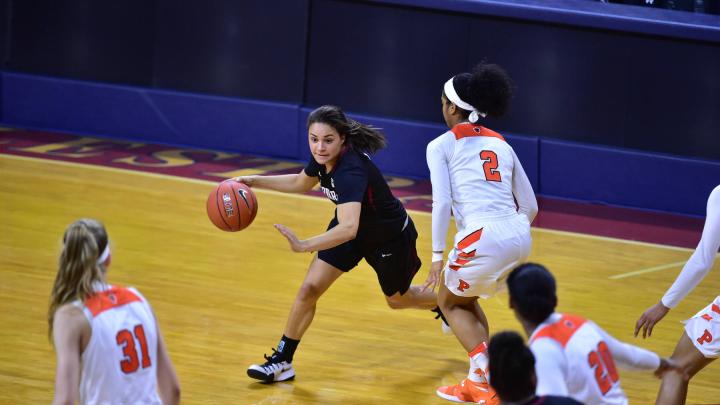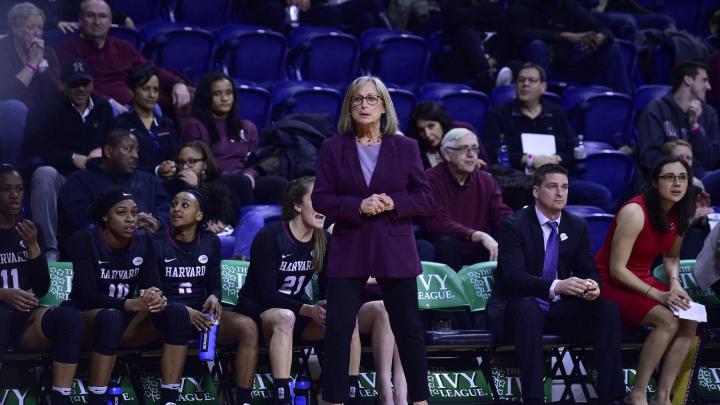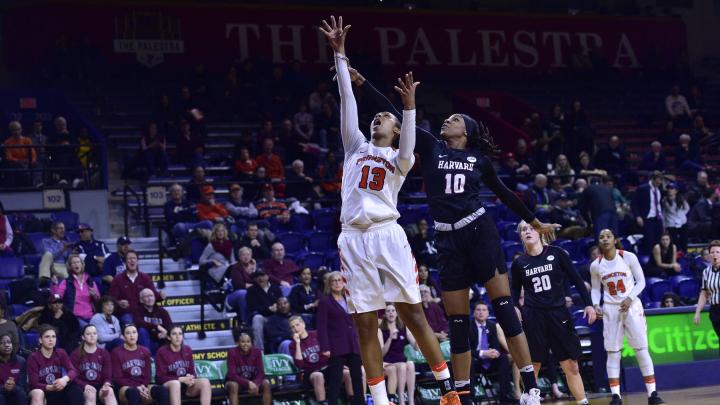On Thursday afternoon, women’s basketball head coach Kathy Delaney-Smith sat on the bleachers in Lavietes Pavilion, still dismayed by her team’s performance in a 68-47 loss to Princeton in the Ivy League tournament semifinals. The coach had watched the replay and charted her team’s shots: the Crimson had missed five open three-pointers and numerous uncontested layups in the first half alone. She said, “We just were unable to hit those shots that go in day in and day out in practice.”
Still, as Delaney-Smith added, her team had “a second chance now.” Harvard had received an at-large berth to the to the Women’s National Invitational Tournament (WNIT), the most-prestigious post-season event after the NCAAs. The Crimson drew a road matchup with the University of New Hampshire, the regular-season champion in the America East Conference, on Friday night.
Harvard made the most of that opportunity, defeating the Wildcats 69-56 to improve their record to 21-8 overall and set up a second-round showdown at St. John’s University in New York at 2:00 p.m. on Sunday.
During the national anthem before every contest, senior co-captain Destiny Nunley says a prayer during which she reminds herself of her priorities for the game. After her poor shooting performance in the Ivy tournament semifinals (Nunley shot one-for-eight from the field), one might have expected her to be thinking about her shooting motion just before tipoff against UNH. She instead focused outside herself: on being a good teammate, playing strong defense, and keeping morale high. “I wasn’t even thinking about shooting,” Nunley said.
Apparently, not thinking about shooting was exactly what she and her team needed to start putting the ball in the basket. The Crimson started hot, sinking five of their first seven shots; and Nunley made all six of her first-half field goal attempts to stake the Crimson to a 33-29 lead.
At halftime, the coaches emphasized the importance of expanding that lead. This was critical because in recent games, including the Ivy tournament contest, when Harvard had trailed Princeton by just one point after the first quarter, the Crimson had withered when their shots stopped falling and their opponents got going. “Our priority specifically,” explained Delaney-Smith, “was to handle the runs.”
The Crimson exhibited the resilience their coach desired, thanks primarily to their interior defense. The Wildcats boast several talented frontcourt players, led by junior center Carlie Pogue (who leads UNH with 16.6 points per game). But Harvard’s frontline of Nunley, Taylor Rooks ’19, and Jeannie Boehm ’20 neutralized the UNH post players through their team defense. A case in point came with a little over six minutes left when the Wildcats called a timeout hoping to stem the Crimson’s momentum. When UNH then called a play to go inside, Rooks (who, as Delaney-Smith said, “came out of the woodwork” with 12 points, two blocks, and three steals) swatted the shot. “A lot of my blocks weren’t necessarily my own,” said Rooks, who explained that she was often able to help away from the player she was guarding because her teammates were making the other team’s player so uncomfortable and therefore commanding her attention.
With Rooks, Boehm, and Nunley patrolling the paint, the Wildcats were unable to mount a serious threat down the stretch, and sophomore guard Madeline Raster dribbled out the clock in the team’s first double-digit win in more than a month.
While the victory represents a major step forward, the Crimson will have less than 48 hours to enjoy it before meeting St. John’s, a member of the high-powered Big East Conference in their second-round game. In the interim, the coaches will likely continue to work on the team’s three-point shooting (the Crimson shot just four for 17 from beyond the arc), seek to jumpstart Boehm’s offense (the freshman made just one of seven shots), and impress upon the players that they are capable of beating the high-powered Red Storm. Delaney-Smith emphasized that she still needs to watch more film of St. John’s, but she said after the UNH game, “They’re very athletic, but so are we.”
Regardless of what happens on the trip to New York, the team can take comfort in having picked up a road win in a post-season tournament against a very talented Wildcats team (UNH went 26-6 this year). After starting the year 16-1, the Crimson—which relies heavily on underclassmen—seemed to lose confidence in dropping five of its last six games. As their coach acknowledged on Thursday, “It’s entirely individually and collectively the mental game with this team.”
By earning a post-season victory, the Crimson has taken a valuable step to restore its belief. Now, it has the opportunity to build on that confidence and position itself for a memorable March run.










